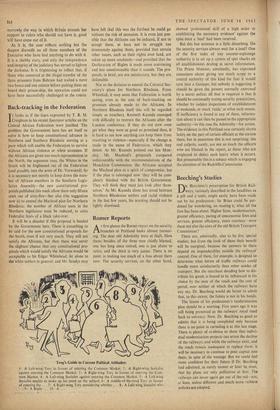Romer Reports
AT T first glance the Romer report on the security 1.breaches at Portland looks almost reassur- ing. The dear old Admiralty were at fault, bless them; besides, of the three men chiefly blamed, one has long since retired, one is just about to retire, and the third is very junior. There is no point in making too much of a fuss about them now. The security services, on the other hand, showed 'professional skill of a high order in establishing the necessary evidence' against the spies once a 'lead' had been received.
But this last sentence is a little disturbing. Do the security services always wait for a. lead? One of the first tasks of any counter-espionage authority is to set up a system of spot checks on all establishments dealing in secret information. The Prime Minister, admittedly, has expressed uneasiness about giving too much scope to a central authority of this kind for fear it would turn into a Gestapo, but nobody is suggesting it should be given the powers normally exercised by a secret police; all that is required is that it should be continually testing security precautions, whether by sudden inspections of establishments at weekends, or mock 'raids,' or other such means. If inefficiency is found at any of them, informa- tion about it can then be passed to the appropriate authority—in this case the Admiralty—for action. The evidence in this Portland case certainly shows laxity on the part of certain officials at the station there, but in peacetime this is not surprising; the real culprits, surely, are not so much the officers who are blamed in the report, as those who are employed to detect such laxity when it occurs. But presumably this is a subject which is engaging the attention of the Radcliffe Commission.










































 Previous page
Previous page